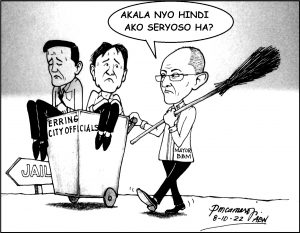THE POWER OF VETO
When President Ferdinand Bongbong Marcos Jr took office after June 30, 2022, one of the important functions
he immediately exercised was to veto several legislative bills already passed by both houses of Congress. Among the bills that the newly inaugurated president vetoed is a legislative measure sponsored by his sister Senator Imee Marcos that sought to create a special economic zone in the province of Bulacan.
The special economic zone bill would have included a 15 billion dollar international airport project of San Miguel Corporation and will be designed to handle and estimated 100 million passengers each year annually compared to the only 31 million passenger capacity of the existing main airport in Manila. In his veto message President Bongbong said, “Fiscal prudence must be exercised particularly at times when resources are scarce and the needs are abundant,” adding that, “Creating a new special economic zone, which offers lengthy and wide ranging tax perks to investors, would pose a “substantial financial risks to the country”.
There were two other legislative bill which he vetoed, these are House Bill No. 9652/ Senate Bill No. 2520 entitled
“An Act Exempting from Income Taxation the Honoraria, Allowances, and other Financial Benefits of Persons
Rendering Service During an Election Period”, and the bill creating the Philippine Transportation Safety Board
(PTSB). In the vetoed bill concerning the tax exemption of the honoraria of those who would serve in the elections the President explained in his message that, “The measure runs counter to the objective of the government’s Comprehensive Tax Reform Program to correct the inequity in the country’s tax system and negate the progressivity of the reforms introduced under RA or the TRAIN law. Moreover, the studies of pertinent government agencies
on the revenue loss is too substantial an impact to be foregone,”.
While on the bill he vetoed regarding the creation of a transport safety board the president simply said that it would only be a duplication of functions already exercised by the other different agencies of the government such as the Department of Transportation (DOTr), the Philippine National Police (PNP) and the National Bureau of Investigation (NBI). Such an action initially earned modest criticism from various sectors in society with some stating that those vetoed by the President were clearly needed to further develop and modernize the nation. But the
opposition to the veto of the president of several legislative bills only goes to show that under the democratic system of the government its various branches are given the opportunity to wield its power of checks and balances in order to insure that no abuse will happen.
In Article VI of the 1987 Philippine Constitution section 27 provides that, “Every bill passed by the Congress shall,
before it becomes a law, be presented to the President. If he approves the same, he shall sign it; otherwise, he shall veto it and return the same with his objections to the House where it originated, which shall enter the objections at large in its Journal and proceed to reconsider it. If, after such reconsideration, two-thirds of all the Members of such House shall agree to pass the bill, it shall be sent, together with the objections, to the other House by which it shall likewise be reconsidered, and if approved by two-thirds of all the Members of that House, it shall become a
law.
In all such cases, the votes of each House shall be determined by yeas or nays, and the names of the Members
voting for or against shall be entered in its Journal. The President shall communicate his veto of any bill to the House where it originated within thirty days after the date of receipt thereof; otherwise, it shall become a law as if he had signed it.” Very clearly then even if the president will veto a bill passed by Congress there remains the opportunity for the latter t overturn such veto by a vote of two thirds of all its members of each house which would
eventually make a vetoed bill turn into a law.
The power to veto by the president is actually a courtesy that is afforded to the highest leader of the land in providing him a chance to exercise his discretion on whether to immediately allow a legislative measure already approved by both houses to become a law or stay its approval in order to consider the objections made by him in the exercise of his power and discretion. It must be understood that the power to veto by the president is an acknowledgment that as the highest leader of the land he is presumed and expected to have more pertinent information about the goings on around the nation and is therefore in a better position to make vital decisions that affect the lives of the very
people of the country that he governs.
SO HELP ME GOD.... ANONG KATUTURAN?
August 13, 2022
Opinion
ITABOY ANG PAGKABAGOT SA PAGTATRABAHO
April 14, 2024
BETTER LATE THAN NEVER
April 14, 2024
TAG-INIT AT EPEKTO SA EDUKASYON!
April 14, 2024
PANGASINE LAUNCHED
April 13, 2024
ATRAKSYON SA ABRIL
April 13, 2024





